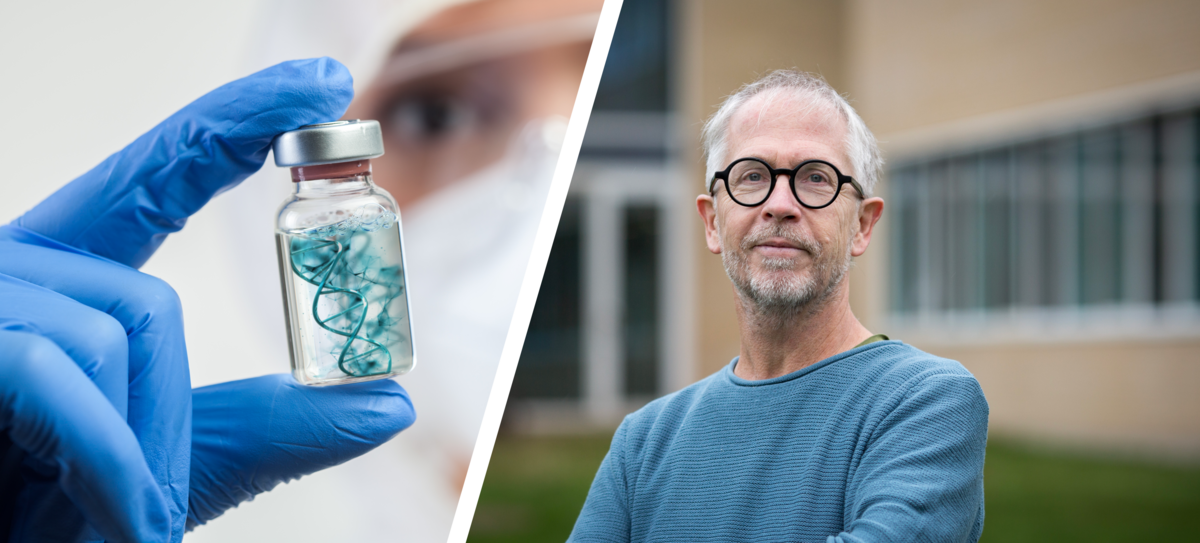New research centre: RNA medicine for better treatment of metabolic diseases
A new team of researchers dreams of making a difference for patients with e.g. diabetes, fatty liver, renal fibrosis, and atherosclerosis. With DKK 60 million from the Novo Nordisk Foundation, centre leader Professor Jørgen Kjems can now open an interdisciplinary centre for RNA medicine research at Aarhus University, which over a period of 6 years will develop more effective types of treatment for metabolic diseases.

Most people are familiar with RNA in the form of the mRNA vaccine against COVID-19. But in a medical sense, RNA can be used for much more than this. For example, RNA medicine has been shown to restore muscle strength in patients with muscular dystrophy and treat other rare or common genetic diseases.
A new research centre, RNA-META, led by Professor Jørgen Kjems at Aarhus University, with DKK 60 million in funding from the Novo Nordisk Foundation, will develop new types of RNA medicine and methods to deliver it to diseased cells for targeted disease treatment. In addition to Kjems, an interdisciplinary team of top researchers will participate: Kurt Gothelf from Aarhus University, Louise Dalgaard from Roskilde University, and Markus Stoffel from ETH Zurich. Their common focus in the research centre will be metabolic diseases such as diabetes, fatty liver, renal fibrosis, and atherosclerosis.
RNA is both the key and the barrier to targeted therapy
RNA is found in all our cells and acts as a messenger from our DNA code to protein production. What's special about using RNA in drug development, as opposed to traditional drugs, is that you can, in principle, programme the drug to affect the amount of any protein in the body. "The RNA can either neutralise or even replace the disease-causing proteins in the affected cells. This means that RNA drugs have an almost unlimited potential for treating human diseases," says Jørgen Kjems.
But there are still many hurdles to overcome before this potential can finally be realised. RNA drugs are large and unstable and one of the major challenges is to effectively deliver the RNA drug to and into cells of the organs that control metabolism, such as the pancreas, kidneys, liver, muscle, and brain.
Expertise to go all the way
The field of RNA and the work to develop RNA medicine is by no means new territory for the researchers. Professor Jørgen Kjems, for example, has worked with RNA for more than 40 years and has published a number of groundbreaking works in the field. The expertise in the research team is highly interdisciplinary and ranges from organic chemistry to cell biology to preclinical disease models, which means that the researchers have the professional strengths to optimise RNA medicine at all levels.
With the new centre, the researchers will focus on developing new and improved treatments for metabolic diseases. The first step in developing these new types of drugs is to equip them with navigation to find their way to the diseased cells in the body.
The researchers will design and construct robust RNA drugs that are tagged with markers that will help the RNA medicine find its target in the body. Here, they will enter the cellular machinery and regulate the genes that control the body's metabolism, thereby alleviating the patients' symptoms.
The RNA medicine must first be tested on cells in the laboratory and then in animal models before it can be tested on humans in clinical trials. To complete the final step, researchers need to work closely with the pharmaceutical industry to ensure that the newly developed RNA drugs will be ready to treat patients.
Recognising ambitious research
The Novo Nordisk Foundation has awarded a total amount of DKK 378,7 million this year within their Challenge Programme to ambitious projects that can help solve society's grand challenges. Jørgen Kjems and his team are one of seven experienced researchers to receive a Novo Nordisk Foundation Challenge Programme grant this year.
"The grant is a great recognition from the Foundation and makes a huge difference to our research. Hopefully, in 5-10 years, we will have medicines for several metabolic diseases for which there are currently only ineffective treatments or no treatments at all. In this way, we hope to make a difference for the large group of patients suffering from metabolic disorders," says Jørgen Kjems.
Key participants in the "CENTRE FOR RNA THERAPEUTICS TOWARDS METABOLIC DISEASE(RNA-META)"
- Professor Jørgen Kjems, iNANO and Department of Molecular Biology and Genetics, Aarhus University. Mail: jk@mbg.au.dk, phone: +45 28992086
- Professor Kurt Vesterager Gothelf, iNANO and Department of Chemistry, Aarhus University
- Professor Louise Torp Dalgaard, Department of Science and Environment, Roskilde University
- Professor Markus Stoffel, Department of Biology, Swiss Federal Institute of Technology in Zurich (ETH Zurich)
